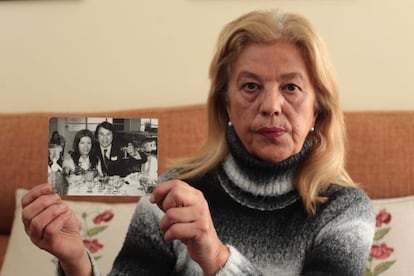Forgotten victims of the troubles
The Basque regional government has announced a compensation plan for the families of around 60 people killed by the security forces in the early 1970s


On June 12, 1976 Alberto Soliño, a 33-year-old musician, had been playing at a nightclub in Eibar, a small industrial town halfway between San Sebastián and Bilbao in the Basque Country. After the performance, he went out to the car park with another band member to put his equipment away. When he noticed his colleague arguing with the owner of a vehicle blocking his way, he went over to see what the problem was, noticing as he approached that the stranger had a gun pressed to his friend's stomach.
At this point, the audience came out into the car park, and when some of them realized what was happening, shouts rang out. Hearing the commotion, Soliño turned, and the aggressor took advantage of his distraction to strike him with the pistol, before shooting him as he lay on the ground. He then picked Soliño up and took him in his car to a nearby hospital, where he was pronounced dead on arrival.
The man who had done the shooting was Luis Carpintero, a Civil Guard officer in plain clothes.
Alberto Soliño's case is just one of around 60 men and women killed by members of Spain's security forces between 1968 and 1978 in the Basque Country under a variety of circumstances. Some were shot during demonstrations, others at checkpoints, and some, like Soliño, by police officers in what appear to have been arguments that got out of control. The Basque government has just announced proposals to compensate their families.
Soliño was married to Isabel González, then aged 24. González says she was warned by the Civil Guard not to bring murder charges against Carpintero. "We were told to report the death as an accident," she says today. A few days after the funeral of her husband, she says a group of Civil Guard officers came to her home to apologize for Carpintero, describing him as "a black sheep."
She says she was never asked to testify about what happened. Carpintero was tried, and ordered to pay compensation of around 6,000 euros, which she had to collect in cash installments each month from her local Civil Guard barracks. She later heard he was suspended from duty, and confined to the Intxaurrondo barracks in San Sebastián. Eventually she was awarded a widow's pension of 567 euros a month.
This move does not justify ETA's arguments that the state also used violence."
Unlike those killed and injured as a result of ETA's 40-year terror campaign, or by the Socialist Party-organized GAL hit squads, which waged a secret war against ETA in the 1980s, the families of victims like Alberto Soliño have been left in a legal no-man's land.
For many people in the Basque Country they are the forgotten victims of the troubles of the last four decades - men and women who were in the wrong place at the wrong time, who had committed no crime, and whose killers, because they belonged to the security forces, were never made to answer for their actions. The phraseology used by the Basque government to describe them in its draft proposal to formally recognize them and compensate their families is "victims of unjust suffering in a political context."
But although the Basque government accepts that the killings took place during a time when much of the Basque Country was either under a state of emergency, as the Franco regime responded with brutality to the increasing attacks by ETA, it has not gone so far as to accept the belief in some sections of Basque society that the Spanish state, even after the death of Franco, applied indiscriminate violence in the region.
"The aim is for the state to recognize it has a role to play in overcoming the hatred of the past," says Idoia Mendia, the Basque regional government's justice chief.
"This move does not in any way justify ETA's arguments that the state also used violence. There was only ever ETA violence, but there were isolated cases of police officers abusing their power. Most of these people were not involved in the conflict. This is a decision that will strengthen our democratic institutions," Mendia adds.
Nevertheless, as the text itself recognizes, many of the killings took place within a political context.
For example, the five construction workers shot by the police in March 1976 when they were leaving a labor union meeting; or the case of Roberto Pérez Jáuregui, who was shot at point-blank range by a plain-clothes police officer at a demonstration in December 1970 to protest the trial of 16 ETA activists, six of whom were sentenced to death by firing squad by a military court.
Pérez Jáuregui's killing took place at a time when Gipuzkoa province was under a state of emergency, and the international press was focused on Spain. The security forces closed off the town of Eibar on the day of his funeral. After his death, no investigation was carried out as to what an armed plain-clothes officer was doing among the demonstrators, and whether he had been identified or threatened in any way. The killer was a member of the infamous Brigada Político-Social, a secret police unit that acquired a deadly, and justified, reputation for its extra-judicial killings of opposition activists during the Franco years. It was not disbanded until 1986. He was subsequently transferred to another province, and promoted.
In 2007, Roberto Pérez Jáuregui was included among the victims of Franco's repression in the so-called Law of Historical Memory, part of measures introduced by the former Socialist Party administration to formally recognize the victims of political, religious and ideological violence on both sides of the Spanish Civil War and of Franco's regime.
"Until then, the state had never admitted what happened, but we have had the support of the people of Eibar," says Pérez-Jáuregui's brother Jorge.
The failure to investigate what happened to Pérez Jáuregui by successive central and regional governments over the last 36 years has, in the mind of many people in the Basque Country, undermined those democratic institutions' legitimacy.
"Pérez Jáuregui was a victim of state terrorism," says his brother bluntly.
Tu suscripción se está usando en otro dispositivo
¿Quieres añadir otro usuario a tu suscripción?
Si continúas leyendo en este dispositivo, no se podrá leer en el otro.
FlechaTu suscripción se está usando en otro dispositivo y solo puedes acceder a EL PAÍS desde un dispositivo a la vez.
Si quieres compartir tu cuenta, cambia tu suscripción a la modalidad Premium, así podrás añadir otro usuario. Cada uno accederá con su propia cuenta de email, lo que os permitirá personalizar vuestra experiencia en EL PAÍS.
¿Tienes una suscripción de empresa? Accede aquí para contratar más cuentas.
En el caso de no saber quién está usando tu cuenta, te recomendamos cambiar tu contraseña aquí.
Si decides continuar compartiendo tu cuenta, este mensaje se mostrará en tu dispositivo y en el de la otra persona que está usando tu cuenta de forma indefinida, afectando a tu experiencia de lectura. Puedes consultar aquí los términos y condiciones de la suscripción digital.








































